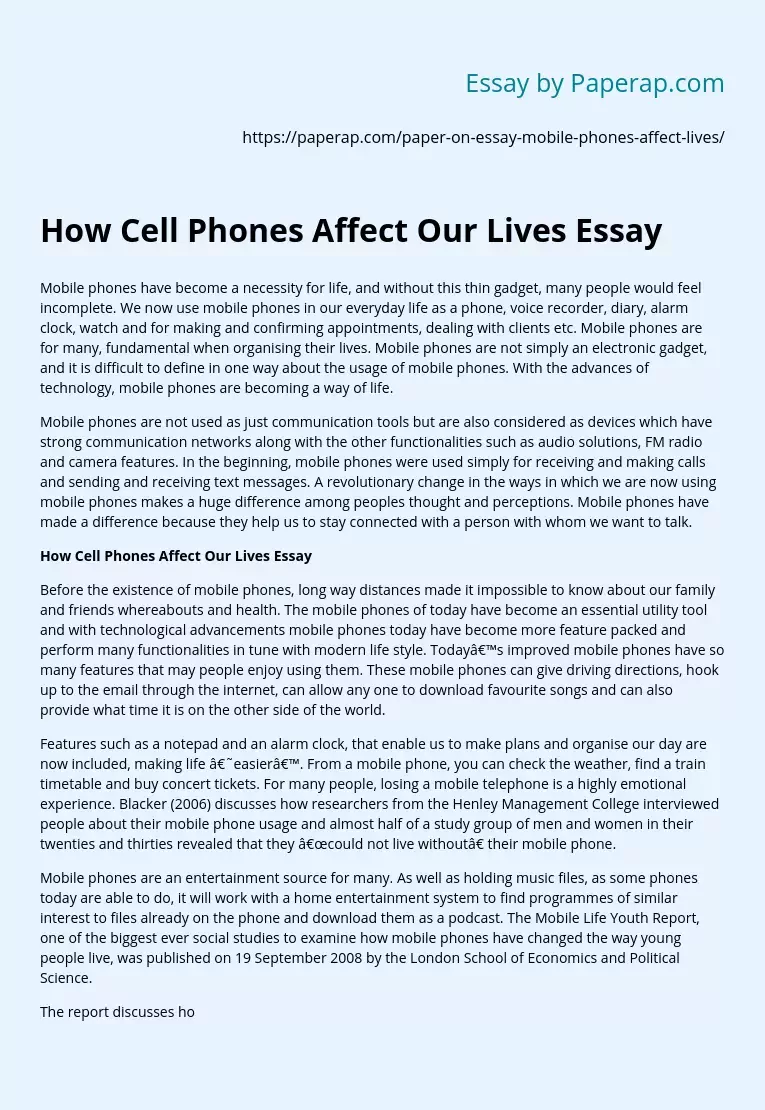How Cell Phones Affect Our Lives Essay
Mobile phones have become a necessity for life, and without this thin gadget, many people would feel incomplete. We now use mobile phones in our everyday life as a phone, voice recorder, diary, alarm clock, watch and for making and confirming appointments, dealing with clients etc. Mobile phones are for many, fundamental when organising their lives. Mobile phones are not simply an electronic gadget, and it is difficult to define in one way about the usage of mobile phones. With the advances of technology, mobile phones are becoming a way of life.
Mobile phones are not used as just communication tools but are also considered as devices which have strong communication networks along with the other functionalities such as audio solutions, FM radio and camera features. In the beginning, mobile phones were used simply for receiving and making calls and sending and receiving text messages. A revolutionary change in the ways in which we are now using mobile phones makes a huge difference among peoples thought and perceptions.
Mobile phones have made a difference because they help us to stay connected with a person with whom we want to talk.
How Cell Phones Affect Our Lives Essay
Before the existence of mobile phones, long way distances made it impossible to know about our family and friends whereabouts and health. The mobile phones of today have become an essential utility tool and with technological advancements mobile phones today have become more feature packed and perform many functionalities in tune with modern life style.
Today’s improved mobile phones have so many features that may people enjoy using them. These mobile phones can give driving directions, hook up to the email through the internet, can allow any one to download favourite songs and can also provide what time it is on the other side of the world.
Features such as a notepad and an alarm clock, that enable us to make plans and organise our day are now included, making life ‘easier’. From a mobile phone, you can check the weather, find a train timetable and buy concert tickets. For many people, losing a mobile telephone is a highly emotional experience. Blacker (2006) discusses how researchers from the Henley Management College interviewed people about their mobile phone usage and almost half of a study group of men and women in their twenties and thirties revealed that they “could not live without” their mobile phone.
Mobile phones are an entertainment source for many. As well as holding music files, as some phones today are able to do, it will work with a home entertainment system to find programmes of similar interest to files already on the phone and download them as a podcast. The Mobile Life Youth Report, one of the biggest ever social studies to examine how mobile phones have changed the way young people live, was published on 19 September 2008 by the London School of Economics and Political Science.
The report discusses how the intimate relationship between user and phone is most pronounced among teenagers, who regard their mobiles as an expression of their identity. “Texting is often used for apologies, to excuse lateness or to communicate other things that make us uncomfortable,” the report says. “It offers intimacy of a particularly controlled form, useful for its discretion … but valued by those who find it difficult to express their emotions more discursively. ” (19 September, 2008). This is partly because mobiles, unlike landlines, are seen as being beyond the control of parents.
But the researchers suggest that another reason may be that mobiles, especially text messaging, were seen as a way of overcoming shyness. Main findings of The Mobile Life Youth Report (2008) include: •Young adults say their mobile phone is more important to them than television •Texting has overtaken talking as the most popular way to use mobile phones •The majority of young women use their mobile phone to deter the unwanted advances of men •Approximately 1 in 10 people have had a mobile phone stolen.
The figure rises to nearly 1 in 5 for young women •Half of people would use their mobile to record a crime, and more than a third would use the camera or video on their mobile phone to snap a celebrity or newsworthy event •Almost half of mobile phone-users think they are too much at the beck and call of their employer as a result of using their mobile phone for work Now that we have widespread cellular coverage, with high-speed data networks in many homes, offices and points of congregation such as coffee shops, we have all we need to get signal to the mobile. In the past, the mobile phone was purely a device for making voice calls.
Now it is a camera, MP3 player, organiser and texting device. The mobile phone assists us in maintaining a fast-paced lifestyle and they are constantly improving with many more to choose from. Mobile phones are now not only used as a way of communicating, but as a source of entertainment and also assist in organising day-to-day activities
References: Blacker, Terrence. Mobile Phones Have Made Us More Civilized, The Independent, May 16 2006. Markley, Andrena. Mobile Phones – A Necessity for Life, Global Press Release Distribution, 3 November 2008. Gould, Phillip. Mobile Life Youth Report, www. mobilelife2006. co. uk, 2008.
How Cell Phones Affect Our Lives Essay. (2019, Dec 05). Retrieved from https://paperap.com/paper-on-essay-mobile-phones-affect-lives/

